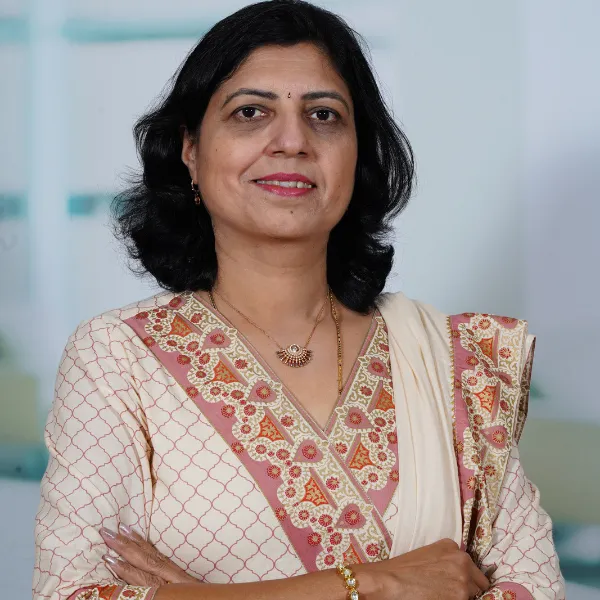From Air Force officer to tech leader: Teja Manakame’s journey is an inspiration for many
Teja Manakame was one of 25 women to join the second batch of women in the Indian Air Force. After a six-year-stint, she joined the IT industry and now as a senior leader at Dell Technologies, Manakame is passionate about tech for social good and spearheads many important initiatives and projects.
Growing up in Belagavi (then Belgaum), a town in Karnataka, Teja Manakame was a curious child. Her father, a doctor, had a scientific explanation for every activity and this led the young Manakame to ask questions, seek answers and engage in hands-in exploration with DIY projects, laying the foundation for a lifelong passion for learning.
The Vice President (IT) at Dell Technologies with a career spanning more than 25 years recalls her first love was astronomy, but the stars didn’t align in her favour.

Teja Manakame
“In the early 1990s, we did not have a college offering astronomy in Belagavi and I could not relocate to Bengaluru or Pune. My family thought that astronomy involved studying during the night and said no. My next thought was to take up engineering and switch to radio astronomy,” she tells HerStory.
A career in uniform
The turning point in her life came while Manakame was in the third year of her Electronics and Communications Engineering course at Karnatak University. The Indian Air Force had, for the first time, opened its doors for women in non-medical areas and two of her seniors had joined. It was exciting to see the women in uniform, and their job seemed to be challenging as well.
“I applied when I was in my final year and was among the top 25 women shortlisted to join the second batch of women officers. After our initial training in at the Air Force Technical College in Jalahalli, Bengaluru, I was posted to Mount Abu,” she says.
Being in uniform, Manakame recollects, brought both thrill and recognition. She remembers walking down Brigade Road in Bengaluru in uniform and people approaching her, and the media being excited about the entry of women officers in the Indian Air Force.
“Some people even asked us if we were air hostesses because they couldn’t relate to this development at that time,” she says, with a laugh.
At Mount Abu, Manakame was one among two women in a station of 300 personnel, including officers and airmen. There was no separate washroom for women, and it was challenging to build trust with older men who hadn’t taken instructions from a woman before. She served other postings in Nashik, and Bengaluru and got a chance to command the entire signals unit of a large station.
Bitten by the IT bug
However, things took a turn when the IT boom hit India and Manakame’s brother, who was already in the industry, spoke about the exciting times that included growth and travel. She completed her short service commission of six years, left the Air Force, and armed with suitable training for the IT industry, joined TCS as a developer.
“I took a pay cut because I had to start as a fresher. After a year, I got a chance to travel to Denmark and after I returned, attended a walk-in interview at Wipro Technologies in the telecom domain, which was my strength. There I worked for accounts like Nortel, switched to the insurance finance domain and worked in the US for Nationwide, an insurance and finance company,” she says.
In 2005, she joined Dell Technologies as a manager and has since then grown through the ranks and is now Vice President (IT) at the company. Interestingly, Manakame was the first woman to be promoted in-house to a Director role in Dell IT in India, breaking gender stereotypes.
At Dell Technologies, she has initiated and spearheads Tech CSR that works at the intersection of tech for social good.
She explains, “While we were always focused on CSR activities, I thought we should do something more with technology. We partnered with NGO Mitra Jyothi that works for the visually impaired to help them build Braille textbooks where the process time was reduced from 14 days to two days. During the pandemic, the Buddha Foundation reached out to us to build a solution for rehabilitation of migrant workers for which we built a mobile-based solution for efficient collation and analysis of data. On request from Government of Karnataka, the team has also built a gamification solution for cybersecurity awareness among children and citizens.”
“This Tech CSR journey continues to excite me as I work with over 300 volunteers,” she adds.
Building leaders
In Dell Technologies, Manakame has traversed different domains–sales and marketing, supply chain, data science, and is now exploring reliability engineering.
“For the past eight months, I have been involved in reliability engineering, digital transformation of AI ops, that is artificial intelligence based. We are trying to leverage Gen AI to transform this AI Ops platform and are looking at making it more efficient,” she elaborates.
Manakame believes role models and mentors are important for women as they climb the ladder. While Dell Technologies offers one-on-one programmes, she believes the mentor circle concept has gone a long way in addressing and overcoming challenges of women.
“Every circle is a group of people along with a mentor. What happens is when people share their thoughts and discuss them, the women realise it’s not their problem alone. This way, they also become each other’s support. Also, some may be hesitant to speak up on a particular topic, but when another woman addresses it, they also get the answer they were looking for. We run these mentor circles throughout the year,” she says.
Manakame is glad that life has changed for the better for women in technology over the years.
“We were only four girls in my class in engineering college. Today, the number is almost equal, and I see that when I go for recruitment in campuses. The society has also evolved—I was the first woman engineer in my family and now a lot of my younger cousins are engineers. This is a welcome change,” she says.
She is also invested in building more leaders.
“I ask myself how I can help others grow from what I have learned. I organise sessions for freshers and women on prioritisation and time management. What does success mean? Many times, we define it as reaching the top. At one of the sessions I attended at NASSCOM, a CFO of a global company spoke of success as a choice you make. It’s not about what people want; peer pressure should not define your success. This resonated well with me,” she says, as she signs off.
Edited by Affirunisa Kankudti







![[Startup Bharat] This Goa startup has developed a platform to solve urban civic issues](https://images.yourstory.com/cs/2/a9efa9c02dd911e9adc52d913c55075e/startup800x400-1585660120136.png)


